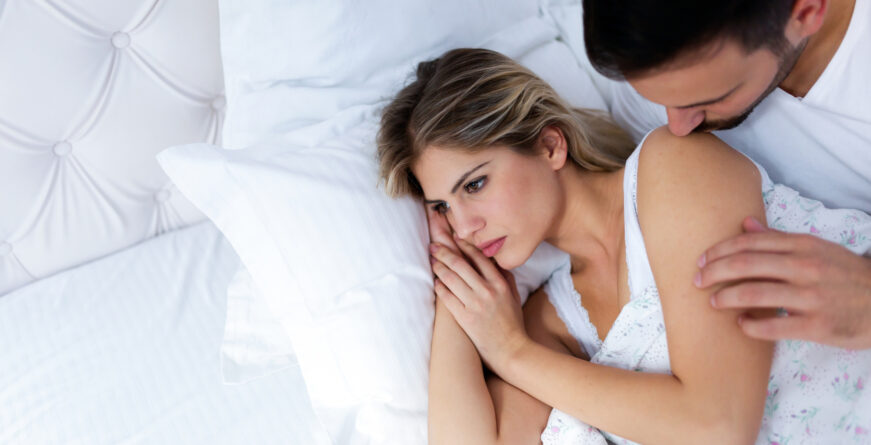
WHAT CAUSES LOW LIBIDO & HOW IS IT TREATED?
Low Sex Drive or Low Libido is typically defined as a deficiency or absence of sexual fantasies and desire for sexual activity. HSDD, or Hypoactive Sexual Desire Disorder, has physicians, sexual health specialists, sex therapists and pharmaceutical companies debating the balance between the physical and psychological causes of low libido.
Main causes of Low Libido
There may be any number of reasons why your partner has a low or no sex drive. Some causes may be physical and some may be psychological but often, it's a combination of the two.
Hormone Imbalance
Since hormones are a critical component of normal sexual response, low levels of testosterone, estrogen and DHEA-S (most commonly associated with post-menopausal women) can have a significant impact on a woman’s sex drive. Even younger women may have low hormone levels which can result in a surprising and disappointing lack of desire for sex and intimacy. For a personal assessment, take our Desire Quiz.
Sometimes people are skeptical. How can hormones really matter that much? Especially when it comes to sex, people are very quick to say, “Oh, that’s ridiculous. It’s all about the relationship,” or, “It’s all about the person’s confidence.”
However, when kids go through puberty, there’s an increase in those hormones that make them interested in sex. When we see a teenage boy ogling a girl, our first reaction is to be amused, assuming that his “hormones are raging.” For teens, we readily acknowledge that hormones are the engine that powers the sex drive, yet we tend to minimize the role hormones play in the sex lives of adults.
Understanding the hormone balance is complicated and a very new area for most physicians. Therefore a woman who complains of no sex drive will require a full battery of blood tests run under the supervision of a physician who specializes in the area of female sexual dysfunction.
Medications
Other culprits of a low sex drive may be certain antidepressants or birth control pills, which can throw off the balance of hormones and create a lack of sexual desire.
We know that anti-depressants like Prozac, Effexor, Lexepro (called SSRI’s or selective serotonin reuptake inhibitors) can cause sexual problems. In addition to a decrease in libido, anti-depressants often cause decreased ability to have an orgasm, or weaker orgasms. In most cases, these side effects go away after someone stops taking the medication.
Post-SSRI Sexual Dysfunction (PSSD) is a new term which doctors and patients are using for the condition in which sexual function does not completely return to normal after the discontinuation of SSRIs or another antidepressant medication. It is not common, but it does occur.
Psychological Factors
There are a number of psychological factors that may have a significant impact on a woman’s libido such as a history of physical or sexual abuse, or simpler issues about body awareness and acceptance .
They may involve a woman’s own feelings about her body and sex, her partner’s feelings about her body and sex or her religious or cultural beliefs.
We also observe in our practice that spontaneous desire may be rarer for women than we originally believed, as it may actually be necessary for women to access or arrange the conditions conducive to desire and arousal; to deliberately provide for themselves by accessing those things that “turn them on”. Many women find vibrators to be very helpful. Learn more about choosing a vibrator and discussing it with your partner or review our list of recommended products to add some fun and playfulness to your sex life.
Treating Low Libido
A combination of medication and behavioral therapy often yield the greatest results. These may include:
- Hormone Therapy
- New FDA-approved medications such as Addyi or Vyleesi
- Vibrators
- Counseling
- Adjustment of current medications
How can I support my partner?
The fact that you're reading this is a significant step, one that is so important to providing support, encouragement and understanding to your partner.
As mentioned, many factors can contribute to a woman's loss of sex drive, but fortunately, treatment options are available. As a partner, the most important thing you can do is to communicate your feelings about how her low sex drive is impacting you and your sex life in a non-judgmental way, without pressure. An open and honest conversation about what has been going on, what could be causing it, and how you can address the issues together may positively impact your relationship.
A great tool that may prompt a healthy conversation is our Sexual Desire Quiz, which measures a woman's level of sexual desire (interest in or wish for sexual activity) in cognitive terms. Your partner can take the quiz alone or you both can take it together and discuss the results. Her score may indicate that her low libido can in fact be treated by a practitioner who specializes in the medical diagnosis and treatment of female sexual dysfunction.
Our blogs about Low Libido are also a great resource for understanding the causes of low sex drive, how specific life-events can impact sex drive, and treatment options.
If your partner is suffering from low sex drive and ready to seek help, encourage her to contact us for a free phone consultation.
